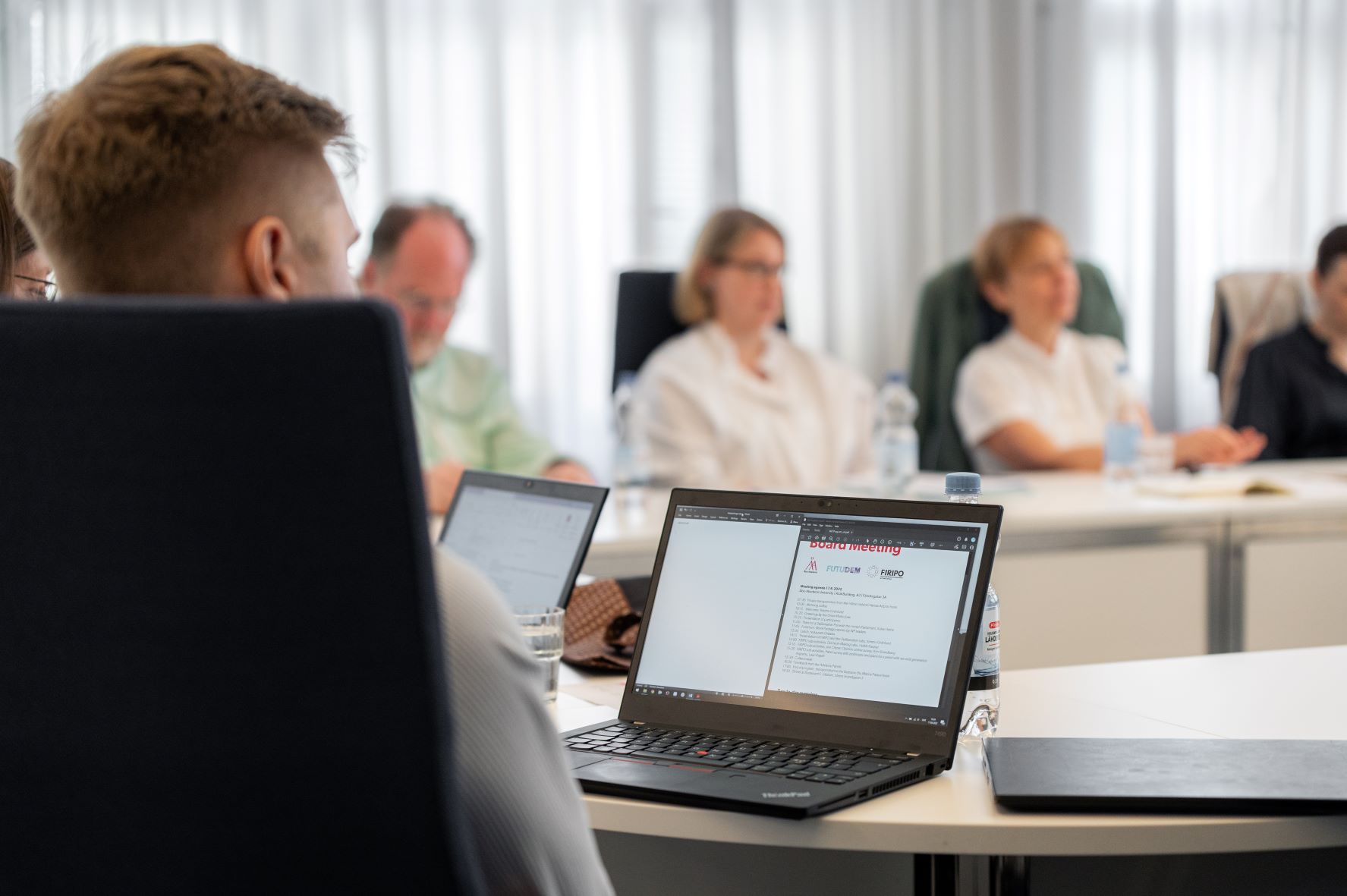
What is FutuDem?
The Future of Democracy, or FutuDem, was one of Åbo Akademi University´s Center of Excellence-projects from 2019 to 2024.
The center launched in 2019, to study the current condition of democracy and to test new deliberative and participatory models of democracy functions in practice, especially democratic deliberation by discussions in small groups on a certain topic. The Social Science Research Institute coordinates FutuDem, with Professor Kimmo Grönlund as its director, and head of research Lauri Rapeli as its Vice Director. PM Albert Weckman is the project coordinator at FutuDem since October 2019. FutuDem consists of seven work packages, with a senior researcher leading each work package.
The research within FutuDem is carried out in close collaboration with leading national and international researchers in democracy. In addition, our researchers collaborate with the Ministry of Justice in Finland, the City of Turku, the Association of Local and Regional Authorities in Finland, and the Swedish Association of Local Authorities and Regions to give hands-on advice on people’s participation in democratic decision-making. The research team at FutuDem consists of researchers in social sciences, in Åbo and in Vasa.


Work packages
-
WP1 aims to establish the extent to which we are witnessing a democratic backslide and to pinpoint the factors that explain the developments. An on-going academic debate concerns whether a democratic backslide is taking place or not (Foa & Mounk 2017; Norris 2017). The disagreement is at least partly due to researchers focusing on different aspects of democracy. As Levitsky and Ziblatt (2018) contend, the weakening of democratic norms and procedures is a multifaceted process that involves institutional changes, elite behavior and/or public opinion. For this reason, it is important to examine democratic backsliding by taking into account behavioral, attitudinal and constitutional dimensions of democratic (de)consolidation (Linz and Stepan 1996). Furthermore, it is imperative to identify the underlying causes that threaten democratic systems. In particular, we need a better understanding of the attitudinal foundations of democratic backsliding. What are the factors that may undermine the support for democracy among citizens? These research questions are investigated by qualitative, quantitative and experimental methods, drawing on cross-national datasets as well as individual level data. Work Package Members at Åbo Akademi University: Professor Carsten Anckar, Dr Catharina Groop, Dr Tomas Karv, Richard Eveli, Fredrik Malmberg, Nanuli Silagadze Work Package External Collaborator: Professor Henri Vogt, University of Turku, Finland.
-
The surge of populist parties, particularly those on the far right, in the last decades has been perceived as a threat or challenge to liberal democracies (Mudde 2004). Populism is defined as a thin ideology that revolves around the belief of a struggle between ‘the pure people’ and ‘the corrupt elite’ and which argues that politics should be an expression of the will of the people (Mudde 2004; Norris & Inglehart 2018). Populist parties challenge the standard procedures and institutions of government. First, WP2 will explain populist attitudes in general and why citizens vote for populist radical right parties in particular. Both the Finnish national election study 2019 and election studies around the world (Comparative Study of Electoral Systems CSES, 2016-2021) will include multiple questions on populist attitudes. These data will be analysed quantitatively to test multiple demand-side explanations relating to the process of modernisation, growing economic insecurity, cultural grievances and distrust towards mainstream parties. Second, the WP will assess populist demands for the renewal of democracy via alternative procedures and decision rules to restore the voice of the people. This is will be done by analysing mass-elite congruence regarding preferences for plebiscitary politics (direct democratic instruments of initiative, referendums and recall). Data include public statements made by populist politicians, cross-national expert surveys of party positions and election surveys.
-
Civic literacy refers to citizens’ ability to understand and participate in democratic politics (Milner 2002). People with high civic literacy are well endowed to communicate their political preferences and to participate in politics. Research has traditionally focused on how civic literacy develops in adolescence and how it affects political behavior. Recent, fundamental changes in the political information landscape demand new answers to these old issues. WP3 studies the consequences of the expansion of digital and social media for civic literacy. With a survey targeting a representative sample of the Finnish voting age population, the WP examines current levels of civic literacy in Finland through comparisons with similar surveys from 2008, i.e. before the rise of ’post-truth’ and Twitter politics (e.g. Lazer et al. 2018). Additionally, the role of high school and vocational school civic education will be a specific focus area and the literacy levels among adolescents will also be compared with data from 2008. Cross-national comparisons of civic literacy will be conducted using the CSES Module 4 data. Building on the team’s vast experience in experimental (survey) research, the WP will design population-based experiments analyzing how individuals at different civic literacy levels react to various political stimuli and how those stimuli affect their political beliefs. Addressing these issues, WP2 fills a gap in our understanding of the role and significance of civic literacy in contemporary democratic politics.
-
WP4 examines potential problems stemming from inequalities in current patterns of political participation. Several democracies have experienced declining turnout and party activity. Simultaneously, non-institutionalized forms of participation such as protests have increased. According to Stoker (2006), this could also be problematic for representative democracy. These changes entail widening resource gaps in participation since resource-strong citizens are more politically active in all forms of political participation (Dalton 2017). This violates a basic democratic principle of giving all affected interests equal consideration. It is an additional problem that political activists become disappointed when new forms of involvement fail to achieve their goals, further eroding belief in politics. WP4 focuses on examining to what extent there is a resource gap in political participation, and what forms of participation are more prone to resource gaps. Do the gaps entail that decision-makers receive biased messages from political activists? If so, do these affect policy outcomes? Does political involvement increase political dissatisfaction among participants? If so, why? We examine these issues in a comparative perspective through available cross-country representative surveys such as the World Values Survey, the European Value Study and the European Social Survey. We also rely on the Comparative Candidate Survey to examine differences in elite attitudes across countries, while population-based experiments are used to test causal mechanisms.
-
Online filter bubbles (Pariser 2011) describe a phenomenon of seeking like-minded milieus. What people read, watch and whom they engage with, is filtered by their pre-existing attitudes and interests. This gives rise to group polarization (Sunstein 2009) and increased occurrence of extreme opinions due to a lack of argumentation and confrontation in the online bubbles, where opposing views are rare (e.g. Farrar et al. 2009). More crucially, this leads to broader societal polarization and less social cohesion, which in turn feeds more polarization. This vicious circle challenges core democratic institutions (Campbell 2016, Sunstein 2009). WP5 has two main purposes; first, it will assess the extent of online filter bubbles and study how citizen behavior in these may cause online polarization which could scale-up to societal polarization. This is done by automated large-N content analysis of social media communication-flows to assess the extent of online filter bubbles and to identify the most important factors, both in communicative network patterns and in the actual speech, within these flows leading to polarization. Having identified these factors, we employ research testing the causes of polarization under controlled circumstances. Second, we study how online tools as democratic innovations can be used for democratic good. Using population-based experiments, we test if, and under which circumstances, online democratic innovations can affect democracies positively, i.e. by increasing civic engagement, promoting constructive discussions and, ultimately, alleviating societal polarization.
-
Deliberative democracy is a normative model, which holds equal and respectful discussion as an essential part of decision-making (Elster 1998). In recent years, many deliberative decision-making mechanisms have been developed and empirically tested. Findings suggest that taking part in deliberation has several positive consequences, e.g. increased trust and political knowledge, opinion change in a more tolerant direction, and increased perspective-taking (Grönlund et al 2010, 2015, 2017). WP6 is interested in the potential of democratic deliberation to alleviate decision-making biases such as motivated reasoning, i.e. information seeking that confirms one’s existing views (Lodge & Taber 2013). So far little is known about the impact of deliberative mechanisms on biases (Mercier & Landemore 2012), e.g. whether diversity of arguments in a deliberative discussion alleviates motivated reasoning or not. We therefore ask, what exactly is the connection between deliberation and decision-making biases, and how this connection is influenced by different types of deliberative institutions? The main method is controlled experiments in citizen deliberation. Participants, recruited through a random sample of the population, discuss in small groups on a certain topic, and decision-making biases are measured before and after taking part. The main experimental manipulation is the type of discussion: free discussion or moderated discussion with rules.
-
WP7 has a synthesizing goal and it will be more active toward the end of the CoE period. WP7 brings together major findings from the six other WPs, combines these findings with other simultaneous and relevant empirical research, as well as covers developments in democratic theory. Kimmo Grönlund, the leader of FutuDem, will be in charge of WP7. Since he has led several population-based experiments in citizen deliberation since 2006, the work within WP will also be able to exploit these earlier findings and data. In collaboration with the scholars in the Scientific Advisory Board and the practitioners involved in the Stakeholder Advisory Board, WP7 will also make concrete recommendations regarding the potential of democratic innovations in general and deliberative reforms in particular.


Community
Director
Kimmo Grönlund
Professor of Political Science, PhD,
Social Science Research Institute,
kimmo.gronlund@abo.fi
Vice Director
or Deputy Leader of the CoE
Lauri Rapeli
Director of Research, PhD, Political Science,
Social Science Research Institute, Åbo Akademi University,
lauri.rapeli@abo.fi
List of Steering Group Members or Equivalent Strategic Decision-makers
Kimmo Grönlund
Chair
Lauri Rapeli
Vice Chair
Kaisa Herne
Professor, PhD, Political Science,
Faculty of Management, University of Tampere
Marko Joas
Professor, PhD,
Public Administration, Åbo Akademi University
Scientific Advisory Board Members
James Fishkin
Professor of International Communication, PhD,
Department of Communication, Stanford, USA
Brigitte Geissel
Professor of Comparative Politics, PhD
Department of Political Science, Goethe University Frankfurt, Germany
Rachel Gibson
Professor of Political Science, PhD,
School of Social Sciences, University of Manchester, UK
PerOla Öberg
Professor of Political Science, PhD
Department of Government, University of Uppsala, Sweden
Diana C. Mutz
Professor of Political Science and Communication, PhD,
Institute for the Study of Citizens and Politics, University of Pennsylvania, US
Maija Setälä
Professor of Political Science, PhD,
University of Turku

